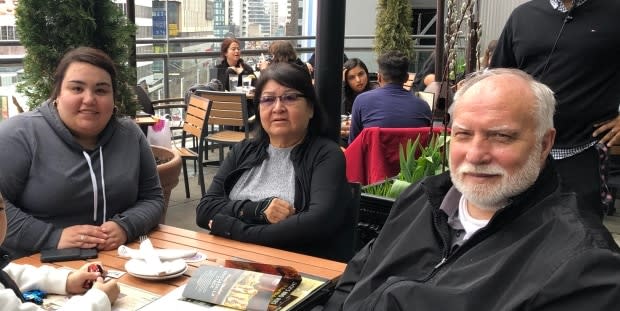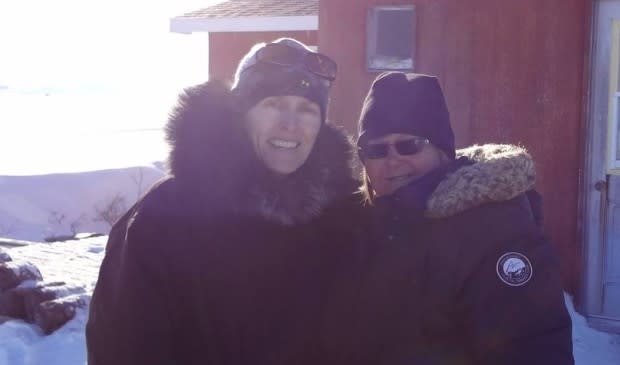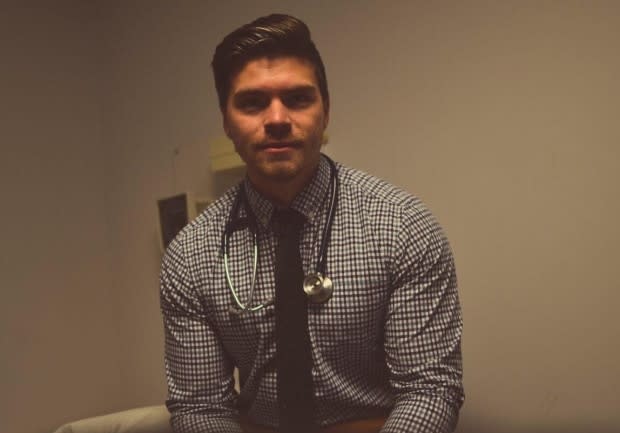Hateful words, diminished services: How racism rears its head for N.L.'s Indigenous people

Mary Janet Hill can't recall the first time she experienced racism.
There was the time Hill, who is from the Innu community of Sheshashiu in Labrador, went to a leadership conference in Newfoundland, and she and her classmates were called gas sniffers. Or the constant reminders of how differently people can be treated because of the colour of their skin, by watching people react differently to her Indigenous mother and her white father.
What she figures for sure is that there isn't a single person in Sheshatshiu that hasn't been on the end of some form of racism during their lives.
"There have been a few [incidents] where it takes you back and you try to figure out what exactly that you did, or what is it that you said that made them react to you the way that they did?" said Hill, CEO of the Innu Development Partnership Ltd.
Even reaching the cabinet table at the federal government doesn't make you immune from experiencing discrimination. Former Conservative MP Peter Penashue, who is also from Shehshatsiu, has in his lifetime seen racist encounters morph from blatant name-calling to nuanced actions and comments.
Racism is felt in Lela Evans's seat in the House of Assembly, where she lobbies — sometimes to deaf ears — for the largely Inuit constituents of her district of Torngat Mountains. It's felt in the office of John Jeddore, a young doctor specializing in neurology, from Conne River.
Around the world, the Black Lives Matter movement ignited countless conversations on race — and on policing, violence, health care, culture, media, language and many other aspects of life.
Here in Newfoundland and Labrador, Indigenous communities are struggling with similar issues, and have been for decades. CBC spoke to a cross-section of people from Innu, Inuit and Mi'kmaq communities. While their experiences vary, the effect on their lives is much the same.
Time doesn't heal all wounds, but it numbs them
Things have changed for Peter Penashue since he was a boy growing up in the 1970s, he says, no doubt about it. Incidents of of overt racism — hateful, derogatory words spat in the face of Innu people — have become less frequent, he said.
But they remain.
In an interview with CBC, the former MP says people have become more careful with their words and in which company they use them.
"It's interesting when you're on the receiving end but after a while you start to … not so much accept racism, but it doesn't sting as much, let's put it that way," said Penashue, 56.
"Racism is still in Goose Bay, it's still there, people have learned that it's an issue they need to be very careful of, and they are, so it's not as blatant as it once was 25 years ago."

In 2011, Penashue became the first Innu from Labrador to be elected to the House of Commons, and the first Innu cabinet minister. He was named minister of intergovernmental affairs in Stephen Harper's Conservative government.
Throughout his personal and professional lives, Penashue has encountered plenty of examples of discrimination or systemic racism in health care, policing, corrections and other institutions.
It shows itself in the care that Indigenous people receive — or, rather, that they do not receive. In the responses they receive when they ask for help, the services they lack, the stereotypes in which they are cast.
'He's probably drunk'
Penashue tells the story of a young woman whose mother called from hospital in Happy Valley-Goose Bay in June 2018, complaining of a lack of medical care.
The daughter, who was working at the Muskrat Falls site, got a ride to the hospital and made it there by 1 a.m., only to be told her mother was fine and was sleeping.
Five hours later, Penashue said, the daughter received a call telling her that her mom had died.
"It tells you that there's something else going on in institutions like the hospital. Why wasn't she getting medical attention?" Penashue said.
"There was another Innu person in the hospital who said she was calling out to nurses but she wasn't getting it."
Listen: Peter Penashue talks about his experiences with racism with CBC reporter Ariana Kelland:
Penashue said the Innu Nation intervened and wrote a letter to the health authority on behalf of the deceased woman's children, and as of last week, the lawyer has still not received a response.
Then there is the case of a young Innu man who Penashue said begged for medical help and was ignored, only to have a heart attack in the hospital's bathroom.
"I think part of it is, it's so unfortunate that many people working these systems say, Oh, this is an Innu person, he's probably drunk, you know, he'll be here the next couple of hours then he'll leave. It's that kind of attitude."
Indigenous mother, white father
Living in the shadows of Innu stereotypes has become a regular part of Mary Janet Hill's life.
Hill said she witnessed what she considers police brutality within the last month against a member of her community, and that she filed a complaint with the RCMP.
How she would be perceived — or believed — weighed heavily on her, and influenced how she interacted with the police.
"I felt like I needed to show them that I wasn't your stereotypical Innu person that they had in mind," she said.

"I felt like I had to make sure that they knew I was educated, that I know what I saw, that I was not drunk, that I was sober."
Systemic racism exists, it does. I see it. I didn't see it before, but as an MHA, I see it. I see it in the way we're being treated, and you know something, it's not news anymore … so who's gonna help us?
- Lela Evans
Hill completed a degree in Indigenous studies at Trent University in Peterborough, Ont., before returning home to Labrador. For the last two years, she has been CEO of the Innu Development Partnership Ltd., which works with companies to provide growth in Innu communities.
Having been raised by a non-Indigenous man and an Indigenous woman, she has seen first hand the difference that skin colour makes. She points to the difference between her service at a restaurant with her father, she said, versus when she is with her mother.
"My parents have shown me many ways that people can be racist towards you, incidents that I've experienced with just my mother alone or just my father alone."
There's a life ring, but the rope is too short
After less than a year sitting in the legislature as a Tory MHA, Lela Evans has learned this: systemic racism exists, and she's already tired of fighting it.
"Nothing has changed. The services are still lacking, we're still far behind, we're actually being pushed further behind," Evans said.
"I think that if we're going to solve these problems and keep these things from coming back time and time again, we got to find permanent solutions, not just generic, superficial solutions that help people feel good but don't help the Indigenous people, the Black people, the minorities that don't have the same access to services."
Evans feels she's trapped in an endless quest to find solutions to complex problems: food insecurity, transportation, children in care, access to reliable internet.

Asked if government views Indigenous groups as an inconvenience, Evans sighs and says, "Yes."
Evans said when media attention dies down on an issue, so does the will to make change.
She said "self-serving logic" often comes with announcements for Indigenous groups — announcements which look and sound good, but in the end, do very little to address problems.
She is currently fighting for internet access for high school and university students on Labrador's north coast. The service is slow and at capacity.
"It's going to cost a lot to upgrade because they've been neglected, the services have not kept up.… Anyone else, if they had road access, they would put in Fibre Op, that would be the next solution, but it costs too much," Evans said.
The federal government has earmarked money for rural Canadian Indigenous populations but Evans said her communities cannot use it for internet because they are so far behind.
"I'm asking the question: how did we get this far behind that we can't even access help now? It's like we're drowning and they're throwing out the life ring to you, but the rope is too short, so that life ring isn't going to save us, we're going to drown unless they extend the rope," Evans said, her voice increasingly more frustrated.
"Systemic racism exists, it does. I see it, I didn't see it before, but as an MHA, I see it. I see it in the way we're being treated, and you know something, it's not news anymore … so who's gonna help us?"
From personal experience
Like Hill, Evans has light and darker skinned relatives. Evans's grandmother was Inuit and her grandfather was of Norwegian descent.
Evans and her sister have different skin complexions.
Has that made a difference? Yes.
"I've been with my sister when she couldn't get service at a counter,' Evans said, speaking of an incident that played out in Happy Valley-Goose Bay.
"[She was] waiting and waiting, everyone else was being served ... And I got mad. I got very angry and she was a little taken aback, but at the time she was actually the principal of our school, she was a leader in the community on the north coast, so that racism exists."
As a light-skinned Indigenous woman, Evans has also heard comments made by people who were not familiar with her background or identity.

More than once she's overheard people say governments shouldn't give Indigenous people money for housing "because they're just going to tear down the house, they're going to beat it up, they're going to burn it."
"One thing I always say is, if somebody is burning part of their house, it's because they're trying to keep their house warm and their kids warm. So how desperate do you have to be? And what situation led to that?"
Passing as white in the workplace
Dr. John Jeddore is hopeful that we're living in a time of changing attitudes.
Jeddore grew up on the Miawpukek First Nation but eventually left his home on Newfoundland's south coast for medical school, the first to do so. He became a neurologist.
He's thankful to have never experienced racism or discrimination from medical colleagues, but he has from patients.
"I have had a patient refuse care, and luckily that's only happened once, after I told them who I was and where I was [from]," Jeddore said.
"And I remember he said — it was a couple years ago now — something to the effect of 'treated by a friggin' Indian, no way.'"
The patient refused to let Jeddore do an exam or take a medical history.

Incidents of racism toward him are rare, but Jeddore suspects it may have to do with the colour of his skin and his white-passing appearance. His father is Miꞌkmaq and his mother is white.
"So that means I kind of get up behind the curtain and look at what a lot of people will say when they think that they're not in the presence of the subject of their discussion," he said.
It presents a unique dilemma for the young doctor who feels compelled to call out racism, while at the same time treating his patients as best as possible.
"You're not quite sure if that's the correct time to have that kind of conversation with them because then you risk kind of losing their trust in you," he said. "I find that if you try to talk to people when they're in a position like they're in the hospital, that they kind of put on the defensive."
Jeddore said there is a lot of misinformation about his First Nation and others, which contributes to a racial divide.
"The fact that people feel like people in reserves just get free money for no reason ... It's a different kind of racism," he said. "Those notions have shifted now to entitlement or this idea that they're getting everything for free, which, of course, is absolutely not true but it kind of it takes away from the success that we've had."
What are the solutions?
So, how do you tackle a problem so engrained in ever facet of our lives?
Jeddore said it starts with having Indigenous people and other minorities in positions of power, but not to rely on them solely to fix a problem that they did not create.
Penashue said Indigenous voices aren't just missing from governments but also on health boards and in policing.
[He said], 'We can't give you policing... there's sidearms, there's guns involved, police carry guns.'" - Peter Penashue
He's a proponent of the Innu having its own police force — something which he said rubbed a government official, an assistant to a deputy minister, the wrong way.
"[He said], 'We can't give you policing... there's sidearms, there's guns involved, police carry guns,'" Penashue recalled.
"And then he stopped and he realized what he had just said. So that tells you in his view the only people who should carry guns are his people and our people are not civilized enough to carry sidearms."
Hill looks to how Nalcor and PAL handled a recent racist incident for how companies and corporations should handle discrimination.
In late 2019, two contractors were fired from their jobs and banned from boarding future PAL flights after making racist comments toward Innu and Inuit passengers. Penashue called them out.
"They listened and they reacted and they didn't shove it under the rug, even though it was not their employees saying these derogatory terms, causing these people discomfort," Hill said.
"I think that stance that they took really championed the way to fight against racism."
From Evans's point of view, marches and social media posts of support don't mean much when populations of people continue to suffer without the proper support they want and need.
Announcements like an inquiry into Innu children in care, for example, don't amount to much unless the inquiry is actually fulfilled, she said.
"Everyone can go away feeling good about themselves but what about the lack of services? What about the lack of supports? What about the lack of caring for people who are exposed to systemic racism?" Evans said.
"We're not solving the problem."
Read more by CBC Newfoundland and Labrador


